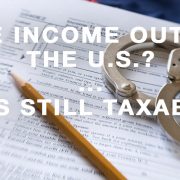Global Tax Chiefs Meet To Tackle International Tax Evasion
Global Tax Chiefs Meet To Tackle International Tax Evasion
The Joint Chiefs of Global Tax Enforcement, known as the J5, which was formed in mid-2018 to lead the fight against international tax crime and money laundering met this week. This group brings together leaders of tax enforcement authorities from Australia, Canada, the United Kingdom, the United States and the Netherlands.
These tax authorities believe that people may be using a sophisticated system to conceal and transfer wealth anonymously to evade their tax obligations and launder the proceeds of crime.
The IRS announced that significant information was obtained as a result and investigations are ongoing. It is expected that further criminal, civil and regulatory action will arise from these actions in each country.
For the United States: Don Fort, U.S. Chief, Internal Revenue Service Criminal Investigation, stated:
“This is the first coordinated set of enforcement actions undertaken on a global scale by the J5 – the first of many. Working with the J5 countries who all have the same goal, we are able to broaden our reach, speed up our investigations and have an exponentially larger impact on global tax administration. Tax cheats in the US and abroad should be on notice that their days of non-compliance are over.”
Penalties for Non-Compliance.
Federal tax law requires U.S. taxpayers to pay taxes on all income earned worldwide. U.S. taxpayers must also report foreign financial accounts if the total value of the accounts exceeds $10,000 at any time during the calendar year. Willful failure to report a foreign account can result in a fine of up to 50% of the amount in the account at the time of the violation and may even result in the IRS filing criminal charges.
Civil Fraud – If your failure to file is due to fraud, the penalty is 15% for each month or part of a month that your return is late, up to a maximum of 75%.
Criminal Fraud – Any person who willfully attempts in any manner to evade or defeat any tax under the Internal Revenue Code or the payment thereof is, in addition to other penalties provided by law, guilty of a felony and, upon conviction thereof, can be fined not more than $100,000 ($500,000 in the case of a corporation), or imprisoned not more than five years, or both, together with the costs of prosecution (Code Sec. 7201).
The term “willfully” has been interpreted to require a specific intent to violate the law (U.S. v. Pomponio, 429 U.S. 10 (1976)). The term “willfulness” is defined as the voluntary, intentional violation of a known legal duty (Cheek v. U.S., 498 U.S. 192 (1991)).
Additionally, the penalties for FinCEN Form 114, Report of Foreign Bank and Financial Accounts (FBAR) noncompliance are stiffer than the civil tax penalties ordinarily imposed for delinquent taxes. For non-willful violations, it is $10,000.00 per account per year going back as far as six years. For willful violations, the penalties for noncompliance which the government may impose include a fine of not more than $500,000 and imprisonment of not more than five years, for failure to file a report, supply information, and for filing a false or fraudulent report.
Lastly, failing to file Form 8938 when required could result in a $10,000 penalty, with an additional penalty up to $50,000 for continued failure to file after IRS notification. A 40% penalty on any understatement of tax attributable to non-disclosed assets can also be imposed.
Voluntary Disclosure
Since September 28, 2018, the IRS discontinued the Offshore Voluntary Disclosure Program (OVDP); however, on November 20, 2018 the IRS issued guidelines by which taxpayers with undisclosed foreign bank account and unreported foreign income can still come forward with a voluntary disclosure. The voluntary disclosure program is specifically designed for taxpayers with exposure to potential criminal liability and/or substantial civil penalties due to a willful failure to report foreign financial assets or foreign in income. In general, voluntary disclosures will include a six-year disclosure period. The disclosure period will require examinations of the most recent six tax years so taxpayers must submit all required returns and reports for the disclosure period. Click here for more information on available Voluntary Disclosure Programs.
What Should You Do?
Recent closure and liquidation of foreign accounts will not remove your exposure for non-disclosure as the IRS will be securing bank information for the last eight years. Additionally, as a result of the account closure and distribution of funds being reported in normal banking channels, this will elevate your chances of being selected for investigation by the IRS. For those taxpayers who have submitted delinquent FBAR’s and amended tax returns without applying for amnesty (referred to as a “quiet disclosure”), the IRS has blocked the processing of these returns and flagged these taxpayers for further investigation. You should also expect that the IRS will use such conduct to show willfulness by the taxpayer to justify the maximum punishment.
We encourage taxpayers who are concerned about their undisclosed offshore accounts to come in voluntarily before learning that the U.S. is investigating the bank or banks where they hold accounts. By then, it will be too late to avoid criminal prosecution or programs with reduced civil penalties. Protect yourself from excessive fines and possible jail time. Let the tax attorneys of the Law Offices Of Jeffrey B. Kahn, P.C. located in Orange County (Irvine), San Francisco Bay Area (including San Jose and Walnut Creek) and elsewhere in California help ensure that you are in compliance with federal tax laws. Additionally, if you are involved in cannabis, check out what a cannabis tax attorney can do for you. And if you are involved in crypto currency, check out what a bitcoin tax attorney can do for you.



 Follow
Follow Follow
Follow